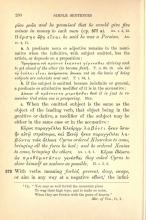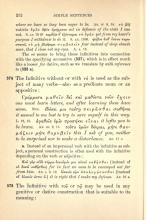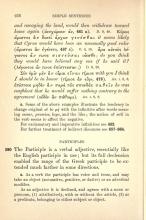The Infinitive
562. The Infinitive is a verbal noun whose range of use has been much enlarged. Originally a to or for dative, it retains that force in some of the most common constructions (§§ 565 and 566, below); the others are developed from this, but the connection is not always clear. The English infinitive with to is in many uses closely parallel.
a. As a verb, the Infinitive has voice and tense, though it does not distinguish person or number; it may take a subject in the accusative, and an object (accusative, genitive, or dative), like the rest of the verb to which it belongs; it is modified by adverbs and particles, including ἄν.
As a noun it may in some uses take the article (neuter) and so be marked as having a noun construction in any case but the vocative.
563. The present, aorist, and perfect Tenses of the Infinitive distinguish kinds of action (as in the subjunctive, optative, and imperative, §§ 475, 483, 484), not differences of time. The future puts the action in a time later than that of the principal verb.
a. When the infinitive represents a finite verb, it retains the tense and tense meaning of the form which it replaces (§ 577, below).
564. The negative with an infinitive is usually μή, except when the infinitive represents an original finite verb which had οὐ; and even then after some verbs there is a tendency to change οὐ to μή (§ 579.a, below).
565. The Infinitive may be connected, as a to or for dative, with verbs, adjectives, adverbs, nouns, or with a whole phrase.
Tὴν χώρᾱν ἐπέτρεψε διαρπάσαι τοῖς Ἕλλησιν.
He gave the land over to the Greeks to plunder (for plundering).
Xen. Anabasis 1.2.19
πολλαὶ ἅμαξαι ἦσαν φέρεσθαι.
There were many wagons to be carried off.
Xen. Anabasis 2.1.6
οὐχ ὥρᾱ καθεύδειν οὐδʼ ἀμελεῖν ἡμῶν αὐτῶν.
It is no time for sleeping or for being careless of ourselves.
Xen. Anabasis 1.3.11
a. This Dative Infinitive has a wide range of meaning, from simple purpose to cases where it merely defines the application of a word or phrase. The dative force can usually be seen, but in or some other preposition may be necessary in translation:
Εἵλεσθε ἄρχειν μου.
You chose (them) to rule over me.
Plato Apology 28e
ἕτοιμος λέγειν
ready to speak (for speaking)
δεινὸς λέγειν
skilled in (with reference to) speaking
οὐχ ἡδέα ἀκούειν
not pleasant to hear.
Demosthenes 4.38
οἷος ἀεί ποτε μεταβάλλεσθαι
(such) as to be always changing
Xen. Hellenica 2.3.45
ἱκανοὶ τᾱ̀ς ἀκροπόλεις φυλάττειν
sufficient for guarding the citadels
Xen. Anabasis 1.2.1
Κλέαρχος στυγνὸς ἦν ὁρᾶν.
Klearchos was repulsive to see.
Xen. Anabasis 2.6.9
οὔτοι συνέχθειν ἀλλὰ συμφιλεῖν ἐφῦν.
I am not one (was not born) to join in hatred, but in love.
Soph. Antigone 523
τοσούτου δέω ὁμολογεῖν
so far am I from agreeing (I lack so much with reference to agreeing).
Demosthenes 9.17
νόσημα μεῖζον ἢ φέρειν
a trouble too great to bear (greater than for bearing).
Soph. Oedipus the King 1293
b. Note the use with ἔχω:
Oὐδὲν εἶχε φράσαι.
He had nothing to tell.
Soph. Oedipus the King 119
This easily passes into the meaning he could tell nothing; hence ἔχω becomes practically equal to δύναμαι, taking an infinitive (most often a word of saying) with or without an object:
οὐδὲ δεῦρο ἰόντες ἐκ τῆς χώρᾱς οὐδὲν εἴχομεν λαμβάνειν.
even when coming hither we could not take anything from the country.
Xen. Anabasis 2.2.11
566. The Infinitive with ὡς or ὥστε is used
a. With adjectives in the comparative, or implying comparison.
Ὀλίγοι ὡς ἐγκρατεῖς εἶναι
too few to have power
Xen. Cyropaedia 4.5.15
βραχύτερα ἢ ὡς ἐξικνεῖσθαι
too short to reach
Xen. Anabasis 3.3.7
ἐλάττω ἔχοντα δύναμιν ἢ ὥστε τοὺς φίλους ὠφελεῖν
having too little force to aid his friends (less than as for aiding)
Xen. Hellenica 4.8.23
γέρων ἐκεῖνος ὥστε σʼ ὠφελεῖν.
He is old for aiding you.
Eur. Andromache 80
b. To denote result, especially an intended result; ὥστε is the usual word in prose, often preceded by a demonstrative; the idea of intention gradually fades out.
Eἶχον τὰ δρέπανα εἰς γῆν βλέποντα ὡς διακόπτειν.
They had the scythes extending toward the ground (as) for cutting in two (whomever they came on).
Xen. Anabasis 1.8.10
πελάσᾱς ὡς συναντῆσαι
riding up so as to meet him.
Xen. Anabasis 1.8.15
νυκτὸς ἰέναι, ὡς μὴ ὁρᾶσθαι
to go by night so as not to be seen
Xen. Anabasis 4.6.13
χρόνῳ ποτʼ ἐξέπρᾱξαν ὡς δοῦναι δίκην.
At length they have wrought it out so as to pay the penalty.
Soph. Antigone 303
Μηχαναὶ πολλαί εἰσιν ὥστε διαφεύγειν θάνατον.
Many devices there are for escaping death.
Plato Apology 39a
πάντας οὕτω διατιθεὶς ὥστε αὐτῷ φίλους εἶναι
so disposing all (putting all into such disposition) as to be friendly to him
Xen. Anabasis 1.1.5
ἔχω τριήρεις ὥστε ἑλεῖν τὸ ἐκείνων πλοῖον.
I have triremes so as to catch their boat.
Xen. Anabasis 1.4.8
δείνʼ ἐπηπείλει, ὥστʼ οὔτε νυκτὸς ὕπνον οὔτʼ ἐξ ἡμέρᾱς ἐμὲ στεγάζειν.
He made dreadful threats, so that neither by night nor day did sleep cover me.
Soph. Electra 779–781
The last example comes very close to the use of ὥστε with an indicative, denoting an actual result (§ 639.a).
c. Sometimes ὥστε with the infinitive states a condition or proviso (cp. § 567, below).
Tῶν λοιπῶν ἄρχειν Ἑλλήνων, ὥστε αὐτοὺς ὑπακούειν βασιλεῖ
to rule the rest of the Greeks, provided they would (so as to) themselves obey the king
Demosthenes 6.11
567. The Infinitive after ἐφʼ ᾧ or ἐφʼ ᾧτε states a condition or proviso.
Oἱ δ ἔφασαν ἀποδώσειν ἐφʼ ᾧ μὴ κᾱ́ειν τᾱ̀ς οἱκίᾱς.
And they said they would give back (the dead), on conditiοn off their not burning the houses.
Xen. Anabasis 4.2.19
ἀφῑ́εμέν σε, ἐπὶ τούτῳ μέντοι, ἐφʼ ᾧτε μηκέτι φιλοσοφεῖν.
we let you off, on this condition however, that you no longer seek wisdom.
Plato Apology 29c
568. The Infinitive is used with πρίν (before).
Διέβησαν πρὶν τοὺς ἄλλους ἀποκρῑ́νασθαι.
They crossed before the others answered.
Xen. Anabasis 1.4.16
κάτειμι πρίν μοι μοῖραν ἐξήκειν βίου.
I go down before my allotted term of life is over.
Soph. Antigone 896
For πρίν with finite modes see § 644.
a. Rarely πρότερον ἤ with the infinitive has the same meaning.
569. The Infinitive is used in some idiomatic phrases, partly offshoots of the dative infinitive (§ 566.a & b, above), partly standing nearer to the adverbial accusative (§ 540). Among the most frequent are
Ὡς εἰπεῖν or ὡς ἔπος εἰπεῖν
so to speak (softening an expression that might seem too strong)
(ὡς) συνελόντι εἰπεῖν
in a word (for one to say, taking it together)
ὡς εἰκάσαι
to make a guess
ἐμοὶ δοκεῖν
in my view, as it seems to me
ὀλίγου δεῖν
almost (to lack little)
ἑκὼν εἶναι
willingly
τὸ νῦν εἶναι
for the present
τὸ κατὰ τοῦτον εἶναι
as regards him
570. The Infinitive is used as object with many verbs.
a. As the only object.
Πιθεῖν Τιτᾶνας οὐκ ἠδυνήθην.
I could not persuade the Titans.
Aesch. Prometheus Bound 206–208
ἔμελλε καταλῡ́ειν.
He was intending to halt.
Xen. Anabasis 1.8.1
εἰς Πῑσίδᾱς βουλόμενος στρατεύεσθαι
wishing to make an expedition against the Pisidians
Xen. Anabasis 1.1.11
φοβοίμην ἂν ἕπεσθαι.
I should be afraid to follow.
Xen. Anabasis 1.3.17
b. With μέλλω (intend, am about), the future infinitive is often used (also the present, sometimes the aorist).
Mέλλω ῡ̔μᾶς διδάξειν.
I am about to explain to you.
Plato Apology 21b
ἔμελλεν αὐτὼ καλώ τε κᾱ̓γαθὼ ποιήσειν.
He was likely to make them what they should be.
Plato Apology 20a
ἔμελλε καταλῡ́ειν.
He was about to halt.
Xen. Anabasis 1.8.1
μέλλω παθεῖν.
I am about to suffer.
Aesch. Prometheus Bond 625
In all other uses the future infinitive may be regarded as representing an indicative (§§ 577 and 578, below).
c. With another object.
Tοὺς ὁπλῑ́τᾱς ἐκέλευσεν αὐτοῦ μεῖναι.
He bade the hoplites remain there.
Xen. Anabasis 1.5.13
ἐποίησε Συέννεσιν μὴ δύνασθαι κατὰ γῆν ἐναντιοῦσθαι Κῡ́ρῳ.
(The Spartan naval commander) made Syennesis unable to oppose Cyrus by land.
Xen. Hellenica 3.1.1
αἱ ἡδοναὶ πείθουσι τὴν ψῡχὴν μὴ σωφρονεῖν.
Pleasures urge the soul not to use self-control.
Xen. Memorabilia 1.2.23
d. From such uses as the last the accusative came to be regarded[fn]A similar growth can be traced in English, in such a sequence as: (1) It is good for us to be here, (2) For us to be here is good, (3) For us to be here is a proof of our friendship. In (1) for us modifies good; in (2) the same construction is possible, but one is inclined to take for us to be here as a clause, the subject of is good; in (3) the last construction is the only one possible.[/fn] as the subject of the infinitive.
Ἐβούλετο τὼ παῖδε ἀμφοτέρω παρεῖναι.
He wished both his sons to be near.
Xen. Anabasis 1.1.1
Σωκράτης ἡγεῖτο θεοὺς πάντα εἰδέναι.
Sokrates believed that the gods know everything.
Xen. Memorabilia 1.1.19
Thus arose the infinitive clause with subject accusative, which received a wide extension, as in Latin.
571. The subject of an infinitive is omitted when it is the same as that of the leading verb; a modifier of the subject, whether predicative or attributive, then agrees with the subject of the leading verb.
Ὁ δʼ ὑπέσχετο ἀνδρὶ ἑκάστῳ δώσειν πέντε ἀργυρίου μνᾶς.
And he promised that he would give five minae in money to each man (cp. § 577.a, below).
Xen. Anabasis 1.4.13
Πέρσης ἔφη εἶναι.
He said he was a Persian.
Xen. Anabasis 4.4.17
a. A predicate noun or adjective remains in the nominative when the infinitive, with subject omitted, has the article, or depends on a preposition.
Ὀρεγόμενοι τοῦ πρῶτος ἕκαστος γίγνεσθαι
striving each to get ahead of the other (to become first)
Thucydides 2.65.10
οὐκ ἐπὶ τῷ δοῦλοι εἶναι ἐκπέμπονται ἄποικοι.
Not on the basis of being subjects are colonists sent out.
Thucydides 1.34.1
b. If the subject is omitted because indefinite or general, a predicate or attributive modifier of it is in the accusative.
Δίκαιον εὖ πρᾱ́ττοντα μεμνῆσθαι θεοῦ.
It is just to remember God when one is prospering.
Menander FCG 118
c. When the omitted subject is the same as the object of the leading verb, that object being in the genitive or dative, a modifier of the subject may be either in the same case or in the accusative.
Κῦρος παραγγέλλει Κλεάρχῳ λαβόντι ἥκειν ὅσον ἦν αὐτῷ στράτευμα, καὶ Ξενίᾱͅ ἥκειν παραγγέλλει λαβόντα τοὺς ἄλλους.
Cyrus ordered Klearchos to come, bringing all the force he had; and he ordered Xenias to come, bringing the others.
Xen. Anabasis 1.2.1
Κῡ́ρου ἐδέοντο ὡς προθῡμοτάτου γενέσθαι.
they asked Cyrus to show himself as zealous as possible.
Xen. Hellenica 1.5.2
572. With verbs meaning forbid, prevent, deny, escape, or aim in any way at a negative effect[fn]Cp. "You may as well forbid the mountain pines
To wag their high tops, and to make no noise,
When they are fretten with the gusts of heaven."
Mer. of Ven., iv, 1.[/fn] the infinitive often has μή, though English omits the negative.
Ἀντέλεγόν τινες μὴ ἰἐναι πάντας.
Some opposed, urging that all should not go.
Xen. Anabasis 2.5.29
τὸν ἄνδρʼ ἀπαυδῶ μήτʼ ἐνδἐχεσθαι μήτε προσφωνεῖν τινα.
This man I forbid any one to receive or address.
Soph. Oedipus the King 236–238
ἐγὼ μόνος ἠναντιώθην μηδὲν ποιεῖν παρὰ τοὺς νόμους.
I alone opposed doing anything contrary to the laws.
Plato Apology 32b
μῑκρὸν ἐξέφυγε μὴ καταπετρωθῆναι.
He barely escaped being stoned to death.
Xen. Anabasis 1.3.2
καταρνεῖ μὴ δεδρᾱκέναι τάδε;
Do you deny that you have done this?
Soph. Antigone 442
a. Mὴ with an infinitive becomes μὴ οὐ if the leading verb has a negative, or is in a question implying a negative.
Oὐδὲν ἐδύνατο ἀντέχειν μὴ οὐ χαρίζεσθαι.
He could not hold out at all against granting the favor.
Xen. Cyropaedia 1.4.2
τί δῆτα μέλλεις μὴ οὐ γεγωνίσκειν τὸ πᾶν;
Why then do you delay (i.e., do not delay) to tell the whole?
Aesch. Prometheus Bound 627
τί ἐμποδὼν μὴ οὐχὶ ἀποθανεῖν;
What is to hinder (i.e., οὐδὲν ἐμποδών) our being put to death?
Xen. Anabasis 3.1.13
b. Most of these verbs admit also the simple infinitive without μή or μὴ οὐ:
Tί κωλῡ́ει καὶ τὰ ἄκρα ἡμῖν κελεύειν Κῦρον προκαταλαμβάνειν;
What hinders our bidding Cyrus occupy the heights also for us?
Xen. Anabasis 1.3.16
c. With verbs of hindering and the like the infinitive may also have the article τοῦ, as a from genitive (§ 509).
Κωλῡ́σειεν ἂν τοῦ κᾱ́ειν ἐπιόντας.
He would prevent them from this attacking and burning.
Xen. Anabasis 1.6.2
573. Some of the above infinitives, even those plainly dative in origin, occasionally have τό, especially in poetry.
Oὗτοί εἰσιν μόνοι ἔτι ἡμῖν ἐμποδὼν τὸ μὴ ἤδη εἶναι ἔνθα πάλαι σπεύδομεν.
These alone are still in the way of our being at once where we have so long been eager to be.
Xen. Anabasis 4.8.14
τὸ βίᾱͅ πολῑτῶν δρᾶν ἔφῡν ἀμήχανος.
act in defiance of the state I can not.
Soph. Antigone 79
καρδίᾱς δ ἐξίσταμαι τὸ δρᾶν.
yet from my heartʼs purpose I withdraw to do it.
Soph. Antigone 1105–1106
φόβος ἀνθʼ ὕπνου παραστατεῖ, τὸ μὴ βλέφαρα συμβαλεῖν.
Fear instead of sleep stands near, that I close not my eyes.
Aesch. Agamemnon 15
The τό seems to bring these infinitives into connection with the specifying accusative (§ 537), which is in effect much like a looser for dative, such as we translate by with reference to (§ 523.a).
574. The Infinitive without or with τό is used as the subject of many verbs also as a predicate noun or an appositive.
Γράμματα μαθεῖν δεῖ καὶ μαθόντα νοῦν ἔχειν.
One must learn letters, and after learning them have sense.
Menander FCG 96
ἐδόκει μοι ταύτῃ πειρᾶσθαι σωθῆναι.
It seemed to me best to try to save myself in this way.
Lysias 12.15
ἀγαθοῖς ῡ̔μῖν προσήκει εἶναι.
It befits you to be brave.
Xen. Anabasis 3.2.11
τοῦτο ῡ̔μῶν δέομαι, μήτε θαυμάζειν μήτε θορυβεῖν.
This I ask of you, neither to be surprised nor to make a disturbance.
Plato Apology 17c–d
a. Instead of an impersonal verb with the infinitive as subject, a personal construction is often used with the infinitive depending on the verb or adjective.
Καὶ γὰρ οὐδὲ πόρρω δοκοῦμέν μοι αὐτοῦ καθῆσθαι. (instead of οὐ δοκεῖ καθῆσθαι)
For in fact we seem to be encamped not far from him.
Xen. Anabasis 1.3.12
δίκαιός εἰμι ἀπολογήσασθαι. (instead of δίκαιόν ἐστιν ἀ)
It is right that I make my defense.
Plato Apology 18a
575. The Infinitive with τοῦ or τῷ may be used in any genitive or dative construction that is suitable to its meaning.
Nέοις τὸ σῑγᾶν κρεῖττόν ἐστι τοῦ λαλεῖν.
For young people silence is better than talking.
Menander FCG 387
ἄρξαντες τοῦ διαβαίνειν
being first in crossing
Xen. Anabasis 1.4.15
ἐκτὸς εἶ τοῦ μέλλειν ἀποθνῄσκειν αὔριον.
you are free from the prospect of dying tomorrow.
Plato Crito 46e–47a
τὸ δὲ τῇ ἐπιμελείᾱͅ περιεῖναι τῶν φίλων καὶ τῷ προθῡμεῖσθαι χαρίζεσθαι, ταῦτα ἔμοιγε μᾶλλον δοκεῖ ἀγαστὰ εἶναι.
But the excelling his friends in attentiveness and in his eagerness to do favors, this rather to my mind appears admirable.
Xen. Anabasis 1.9.24
οὐ πρὸς τῷ πόλεις ἀνῃρηκέναι τίθησι τὰ Πῡ́θια;
Besides having destroyed states, does he not conduct the Pythian festival?
Demosthenes 9.32
ἐπὶ τῷ συνοίσειν ταῦτα πεπεῖσθαι λέγειν αἱροῦμαι.
I choose to speak because of my conviction that these measures will be for your interest.
Demosthenes 4.51
κινδυνεύσαιτʼ ἂν τῷ τὸν Ἑλλήσποντον ἀλλοτριωθῆναι.
You would be endangered by the fact that the Hellespont has become anotherʼs.
Demosthenes 9.18
576. An Infinitive with τοῦ is sometimes used to express purpose.
Μίνως τὸ λῃστικὸν καθῇρει τοῦ τᾱ̀ς προσόδους μᾶλλον ἰέναι αὐτῷ.
Minos put down piracy, that his revenues might come to him better.
Thucydides 1.4
This may be regarded as a genitive of cause; ὑπέρ or ἕνεκα is sometimes put with it.
577. An infinitive clause, with or without the article, often represents a sentence with a finite verb; the original sentence is thus changed to a noun and made part of another sentence, in one of the constructions above described. Most often such an infinitive is the subject or object of a verb of saying or thinking—that is, a verb meaning say, tell, hear, learn, or think, believe, know, and the like. In such infinitive clauses
a. The original tense and tense meaning are retained, the time (if the original verb was an indicative) being relative to that of the principal verb. The future infinitive is found chiefly in this use.
An imperfect or pluperfect indicative, as these tenses are not made in the infinitive, is represented by the present or perfect—the infinitive of the same tense-system.
b. If the original sentence had οὐ, that is usually retained, but is sometimes changed to μή (§ 579.a, below).
c. If an original indicative or optative had ἄν, that is retained. Thus ἄν with an infinitive shows that the infinitive represents an indicative or optative with ἄν (§ 579, below).
578. The infinitive representing a finite verb often stands as object with certain verbs of saying or thinking:
Ἐγώ φημι ταῦτα φλυᾱρίᾱς εἶναι (representing ταῦτα φλυᾱρίαι εἰσί)
I say that this is nonsense.
Xen. Anabasis 1.3.18
ἀντιλέγειν φῇς τοῖς βουλομένοις ἡμᾶς ἀπολέσαι.
You say you spoke against (ἀντέλεγον, 577.a, above) those who wished to destroy us.
Lysias 12.26
οὐκ ἔφη ὀμεῖσθαι.
he said he would not take an oath (οὐκ ὀμοῦμαι).
Xen. Hellenica 1.3.11
ὀμόσαντες ὅρκους ἦ μὴν μὴ μνησικακήσειν
taking oaths that they would verily maintain amnesty for the past (οὐ μνησικακήσω, οὐ being here changed to μή because of the idea of will implied in an oath).
Xen. Hellenica 2.4.43
Nομίζω ῡ̔μᾶς ἐμοὶ εἶναι καὶ πατρίδα καὶ φίλους.
I think you are (ῡ̔μεῖς ἐστε) to me both country and friends.
Xen. Anabasis 1.3.6
οἰόμενοι τὰ πάντα νῑκᾶν καὶ Κῦρον ζῆν
thinking they were completely victorious and Cyrus was alive (νικῶμεν, ζῇ).
Xen. Anabasis 2.1.1
ῡ̔μᾶς ἔγωγε ἀκούω τοὺς Λακεδαιμονίους ἐκ παίδων κλέπτειν μελετᾶν.
I hear that you Spartans practise stealing from childhood (μελετᾶτε).
Xen. Anabasis 4.6.14
πείσεσθαι προσδοκῶν
expecting that he will suffer (πείσομαι)
Demosthenes 6.18
ἆρα προσδοκᾶν αὐτοὺς τοιαῦτα πείθεσθαι οἴεσθε;
Do you suppose they expected (προσεδόκων) to be suffering like this?
Demosthenes 6.20
a. So also as the subject (with λέγεται and the like, § 574, above), as appositive, and in the personal construction (§ 574.a, above).
Ἐλέγετο Κύρῳ δοῦναι χρήματα πολλά.
She was said to have given Cyrus a large sum.
Xen. Anabasis 1.2.12
τοὺς ἀγαθοὺς εἰς πόλεμον ὡμολόγητο διαφερόντως τῑμᾶν.
He was acknowledged to honor exceptionally those who were good for war.
Xen. Anabasis 1.9.14
καὶ γὰρ οὐδὲ πόρρω δοκοῦμέν μοι αὐτοῦ καθῆσθαι.
For we seem to me to be encamped by no means far from him.
Xen. Anabasis 1.3.12
b. Future infinitives with ὥστε fall under this head, scarcely differing at all from ὥστε with a future indicative (§ 639.a).
Mωρίᾱ τηλικαύτην ἡγεῖσθαι πόλιν οἰκεῖν τὸ μέγεθος ὥστε μὴ δεινὸν πείσεσθαι.
It is folly to think the state we live in is so great that we shall suffer nothing serious.
Demosthenes 9.67
579. An Infinitive with ἄν represents an indicative or optative with ἄν (§§ 461, 467, 479, 480), the context alone determining which.
Ἀκούω Λακεδαιμονίους τότε ἐμβαλόντας ἂν καὶ κακώσαντας τὴν χώρᾱν ἀναχωρεῖν ἐπʼ οἴκου πάλιν.
I hear that the Spartans in those times, after invading and ravaging the land, would then withdraw toward home again (ἀνεχώρουν ἄν, § 461.a).
Demosthenes 9.48
Κῦρος ἄριστος ἂν δοκεῖ ἅρχων γενέθαι.
It seems likely that Cyrus would have been an unusually good ruler (ἄριστος ἂν ἐγένετο, § 467.c).
Xen. Economics 4.18
ἆρα αὐτοὺς λέγοντος ἄν τινος πιστεῦσαι οἴεσθε;
Do you think they would have believed any one if he said it? (λέγοντος ἄν τινος ἐπίστευσαν;)
Demosthenes 6.20
Σὺν ῡ̔μῖν μὲν ἂν οἶμαι εἴναι τῑ́μιος.
With you I think I should be in honor (τμιος ἂν εἴην, § 479).
Xen. Anabasis 1.3.6
ἐπίστευε μηδὲν ἂν παρὰ τᾱ̀ς σπονδᾱ̀ς παθεῖν.
He was confident that he would suffer nothing contrary to the agreement (οὐδὲν ἂν πάθοιμι).
Xen. Anabasis 1.9.8
a. Some of the above examples illustrate the tendency to change original οὐ to μή with the infinitive after words meaning swear, promise, hope, and the like; the notion of will in the verb seems to affect the negative. For exclamatory and imperative infinitives see § 492. For farther treatment of indirect discourse see §§ 657 – 664.













